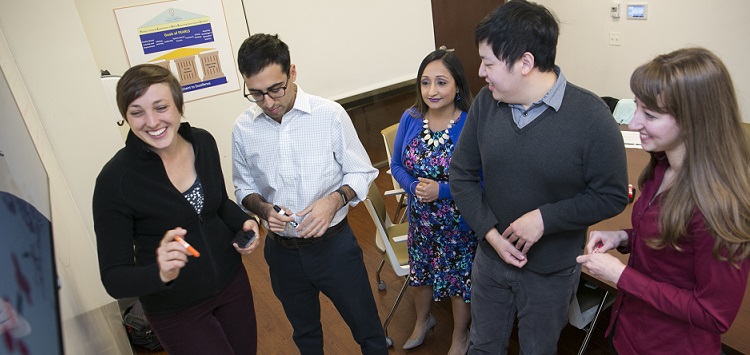FTB
Fueling the Body (FTB) integrates how the body acquires essential nutrients, the structures that are involved in the processing of the nutrients for proper digestion and absorption, as well as the metabolic mechanisms that enable the cells to utilize these nutrients.
The course unfolds through a series of PEARLS cases that illustrate how cells in the body are fueled. The course highlights the micronutrients (vitamins and minerals) and macronutrients (carbohydrates, proteins, and lipids) as requirements for energy metabolism. Normal nutrition and extremes of nutrition (malnutrition and obesity) are explored through their impact on the individual patient and on population health in general.
Study of the normal physiology of these organ systems and their roles in digestion and absorption of nutrients is integrated with exploration of the mechanisms by which diseases disrupt gastrointestinal function. Structure laboratory experience includes the anatomy and dissection of the abdomen and its inter-related structures, accompanied by a more detailed clinical analysis of the abdomen through CT and bedside ultrasound medical imaging and the underlying pathologic processes represented. Biopsychosocial and clinical aspects of metabolic and gastrointestinal health and disease complement the students’ learning of normal and abnormal metabolism.
During ICE, students continue interacting with patients in Medicine and Ob/Gyn ambulatory practices and in addition have surgical ICE experiences
- Course Goals
Course Goals
- Understand the basic concepts and principles of fuel metabolism in humans at the cellular, organ and total body level.
- Understand lipid, glucose, and protein metabolic pathways in different tissues in both the fed, fasted and starved states.
- Understand the basic guidelines of nutrition and their relevance in disease etiology, management and prevention.
- Predict consequences of metabolic dysregulations and understand the use of pharmacological intervention in treatment and/or management of metabolic diseases.
- Understand how the anatomy and physiology of the gastrointestinal tract relate to digestion, storage and absorption of foodstuff and excretion of waste products.
- Understand the endocrine and exocrine functions of the pancreas.
- Understand how inflammation, obstruction, and neoplasm can impact the normal function of the digestive organs.
- Understand the central role played by the liver and biliary system and how impaired liver function adversely impacts homeostasis.
- Apply principles of gross anatomy, histology, and pathology to solve clinical problems related to the gastrointestinal system.
- Correlate pathology on a cellular level with gross organ pathology for major diseases of the gastrointestinal system and relate this back to normal histology and gross anatomy.
- Understand the role of imaging modalities in the diagnosis of disease related to the gastrointestinal system and interpret fundamental imaging studies of these systems.
- Understand development of the gastrointestinal system and relate specific defects in developmental processes to congenital pathologies.
- Approach patient encounters with professionalism and respect for the patient, caregivers, and the medical team.
- Use communication skills to build rapport with patients and assess a patient's condition.
- Perform a hypothesis-driven physical examination on a patient who has diabetes.
- Understand the rationale behind the advanced abdominal exam as it pertains to various intraabdominal pathophysiology.
- Perform technically valid ultrasound examinations of the gastrointestinal system.
- Generate a reasonable differential diagnosis organized by system, pathophysiology, and epidemiology based on a patient's history.
- Document and present a patient's history of present illness.
- Understand the Zucker School of Medicine's drivers and their relationship to patient care: the continuum of care, decision making with uncertainty, social context and responsibility, quality and effectiveness, and scientific discovery.
- Prepare, present and facilitate discussion of higher order questions.
- Perform a detailed and concise self and group assessment of performance.
- Understand how to work as a productive member of a group.
- Clinical Learning Objectives
Clinical Learning Objectives
- Assessment Methods
Assessment Methods
Students are assessed in a variety of ways to generate a grade in the courses completed in the First 100 Weeks. As a faculty member or resident who is responsible for supervising a student, you will be expected to complete one or more assessment forms. The questions/anchors can be found at this link. (insert)
- Monitoring (for students)— MS 1
As noted above, patient encounters will be monitored by completion of the patient log on one45. At the midpoint of each course, students should review the patient log on their own in the form of “expectation grids” for self-assessment purposes and should discuss the patient log with their ICE preceptor or ICE Site Director during mid-clerkship feedback. This will allow students to focus subsequent clinical encounters to maximize the chance of a direct clinical experience with patients or procedures listed above. Directions for reviewing “Expectation Grids” can be found XX.

